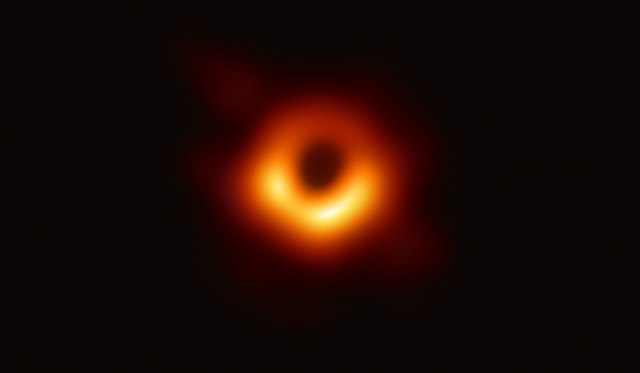Looking Into Un Trou Noir – Black Holes In French Posted by John Bauer on Apr 10, 2019 in Vocabulary
Today is a special fan for fans of l’espace (space) and all the wonders of the cosmos beyond notre système solaire (our solar system). The international group of scientists behind the Event Horizon Telescope released the first images in history of un trou noir (a black hole)!
L’image historique (the historic image) may look a little dull after expecting something truly magical from le trou noir, but there is a lot of cool information radiating out that can be hard to miss.
It may not look like much more than a coffee stain or a smoldering candle, but la tache floue (the smudge) really is le trou noir of the distant galaxy, Messier 87, une galaxie (a galaxy) named after the l’astronome français (the French astronomer) who first discovered it, Charles Messier.
Maybe l’image would be more emotional it were from la Voie lactée (the Milky Way). However, taking a moment to think about just how far away le trou noir supermassif (the super massive black hole) is really helps to appreciate this incredible petite tache orange (small orange smudge).
I mean, at 53 millions d’années-lumière (53 million light years) away, you would need some seriously long arms to reach it!
Now if you’re like me and missed out les cours de l’astrophysique (the astrophysics classes) back in high school, a lot of the explanations of the amazing image quickly get lost in all the scientific jargon and complicated formules (formulas).
Adding le français may seem to just add to la confusion (the confusion), but this historic moment also means there’s no better time to learn le vocabulaire d’un trou noir (the vocabulary of a black hole)!
These mysterious forces of nature are invisible and because of l’horizon d’un trou noir (the event horizon) it would be impossible to ever really see one. L’horizon is a scientific term for the point at which there’s no escaping un trou noir. It’s the point of no return for anything that gets too close to un trou noir, even la lumière.
That may not seem like a big deal, but without la lumière ever reaching our eyes, there’s nothing to see.
Cela dit (that said), in some circumstances things end up orbiting un trou noir and giving off light, if they are far enough away from l’horizon.
It’s this fast travelling stuff orbiting le trou noir that lets us, in some sense, see it. The actual black hole is still nothing but le noir (blackness), but the dim light that is la tache floue (the smudge) lets us make out a real image of l’ombre du trou noir (the shadow of the black hole)!
While you enjoy this historic moment in l’astrophysique, I hope this cours intensif (crash course) in scientific French had enough gravity to pull you in and give you a new way to enjoy the big news.
Voici un vocabulaire de trou noir (here’s a black hole vocabulary):
Black hole – Le trou noir
Event horizon – L’horizon, l’horizon d’un trou noir, l’horizon des événements
Invisible – Invisible
Gravity – La gravité
Light – La lumière
Light year – L’année lumière
Speed of light – La vitesse de lumière
Celestial objects – Les objets célestes
Astronomer – L’astronome
Telescope – Le télescope
Star – L’étoile
Sun – Le soleil
The Solar System – Le Système solaire
Galaxy – La galaxie
The Milky Way – La Voie lactée
Orbit – L’orbite
To orbit – Graviter autour de, tourner autour de
Space – L’espace
Universe – L’univers
Crash course – Le cours accéléré, le cours intensif
Astrophysics – L’astrophysique
Astrophysicist – L’astrophysicien
Science – La science
Formula – La formule

Build vocabulary, practice pronunciation, and more with Transparent Language Online. Available anytime, anywhere, on any device.






Comments:
Joseph T Madawela:
this very informative and ejoyable. Merci